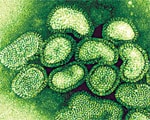Of those who have died of H1N1 flu, two thirds had at least one chronic high-risk neurodevelopmental condition, such as epilepsy, cerebral palsy or developmental delay.

Bacterial infections - such as bacterial pneumonia - were another contributing factor to an increased risk of death in children, including most children older than 5 who didn't have a pre-existing high-risk medical condition. This suggests that bacteria, in tandem with the H1N1 virus, can cause severe disease in children who may be otherwise healthy.
The officials, from Centers for Disease Control and Prevention, stressed that the death rates and complications from swine flu in children are very similar to these rates seen in children sickened by the seasonal flu each year.
The officials noted one difference in death rates of children stricken with seasonal flu vs. the new strain of pandemic flu. In past seasonal flu outbreaks, the children who died tended to be 5 years or younger. But since the H1N1 virus first surfaced in mid-April, the death rates have been higher for children older than 5 years.
The experts continued to emphasise that for most people, adults included, infection with the H1N1 pandemic flu produces mild illness and the recovery is fairly quick. And the virus has shown no signs of mutating into a more virulent form during its travel from the northern hemisphere to the southern hemisphere.
The CDC is recommending that all children aged 6 months and older be vaccinated against the pandemic flu virus. Children should also be vaccinated for seasonal flu. Children, particularly those with underlying medical conditions, need to be treated promptly if they develop a fever, and are at the front of the line for vaccination when it becomes available.
Significantly 22 children who died had neurodevelopmental conditions, which obviously raised their risk. Such children should clearly be high in the priority list for immunisation not only against the H1N1 pandemic flu, but also against the seasonal flu.
Besides children and young adults, who seem to lack immunity to the H1N1 virus, pregnant women, people with preexisting health problems, such as diabetes, and health-care workers also top the CDC's list of vaccine candidates once it becomes available.
DoctorNDTV is the one stop site for all your health needs providing the most credible health information, health news and tips with expert advice on healthy living, diet plans, informative videos etc. You can get the most relevant and accurate info you need about health problems like diabetes, cancer, pregnancy, HIV and AIDS, weight loss and many other lifestyle diseases. We have a panel of over 350 experts who help us develop content by giving their valuable inputs and bringing to us the latest in the world of healthcare.












